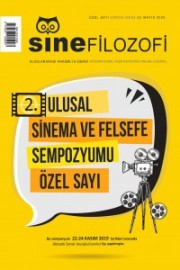Modernliğin Müphem Öznelliği Çerçevesinde Bukalemun İnsan Zelig
The Chameleon Man Zelig in the Frame of the Ambivalent Subjectivity of Modernity
Author(s): Deniz KurtyılmazSubject(s): Philosophy, Film / Cinema / Cinematography
Published by: Serdar Öztürk
Keywords: Woody Allen; Zelig; modernity; individual; ambivalence;
Summary/Abstract: In his Oration on the Dignity of Man, published in 1496, humanist Giovanni Pico della Mirandola deciphered the enigma of modern subjectivity when he heralded that Man is infinitely free to be whatever he chooses to be. Indeed, to be modern, at first, is to be liberated as an individual, which means dreaming to produce a bold subjectivity by demanding independence from all external powers. Zygmunt Bauman also addresses that during the Renaissance, the image of the “chameleon-man” has been stressed to an excruciating extent basically to state the first invention of modernity, the idea of a subject who has gained the freedom to live in one’s own chosen form of existence. However, if the process of its historical evolution is examined, it becomes clear that modern subjectivity carries a paradox in itself. On the one hand, the individual will only be able to create himself by breaking away from all ties with a radical demand for freedom; but, on the other hand, in so doing, the same individual will also inevitably lose his material (social) and spiritual (metaphysical) principle and values that add meaning to his existence. The modern man, who is free to be a self-made individual, suffers from a confusion as to what this means and cannot build a healthy subjectivity contrary to expectations. In this context, Woody Allen’s film Zelig (1983) presents a well-caricatured reflection of this crisis. Leonard Zelig, who gave his name to the film, appears as a satire of the modern ambivalence as a figure who begins to resemble others both physically and psychologically when he stays with them for more than a few minutes. Moreover, the ambivalence is not limited to the content but also spreads to the narrative of the film. Since Allen's work is a mockumentary, it has a “nomadic” form that blurs the boundaries between reality and fiction. Our study, which aims to subject the film to a philosophical examination on the basis of the ambivalence of modern subjectivity, will deconstruct the work and make inferences about the modern/contemporary individual.
Journal: SineFilozofi
- Issue Year: 5/2020
- Issue No: Sp. Iss
- Page Range: 110-129
- Page Count: 20
- Language: Turkish

